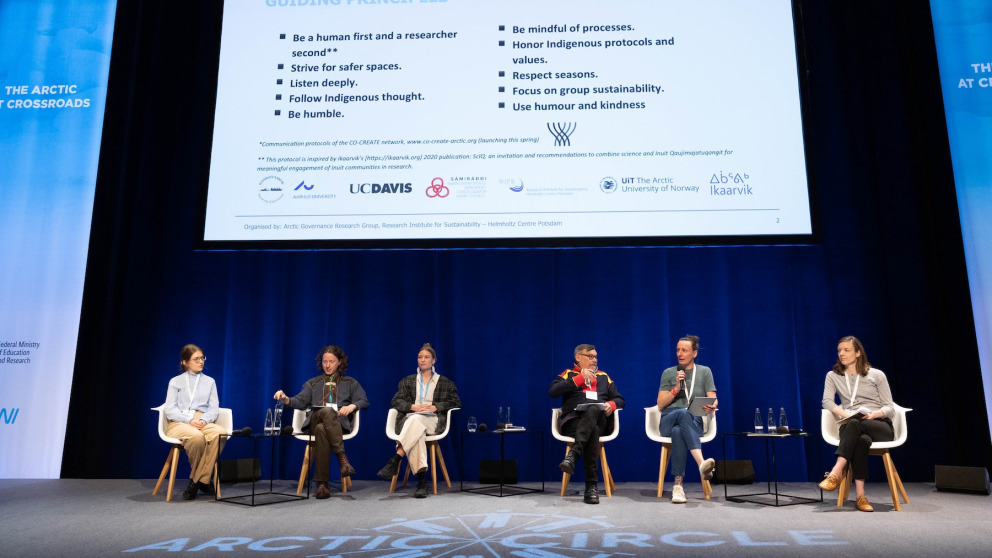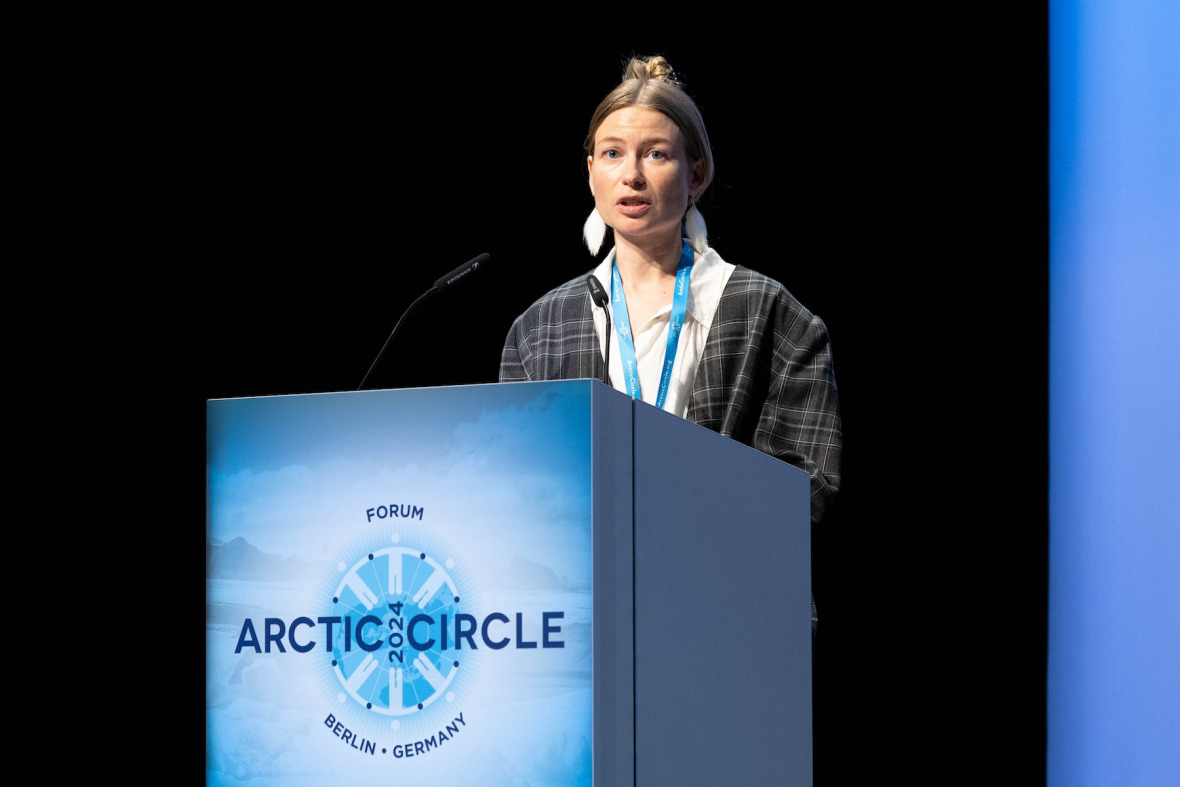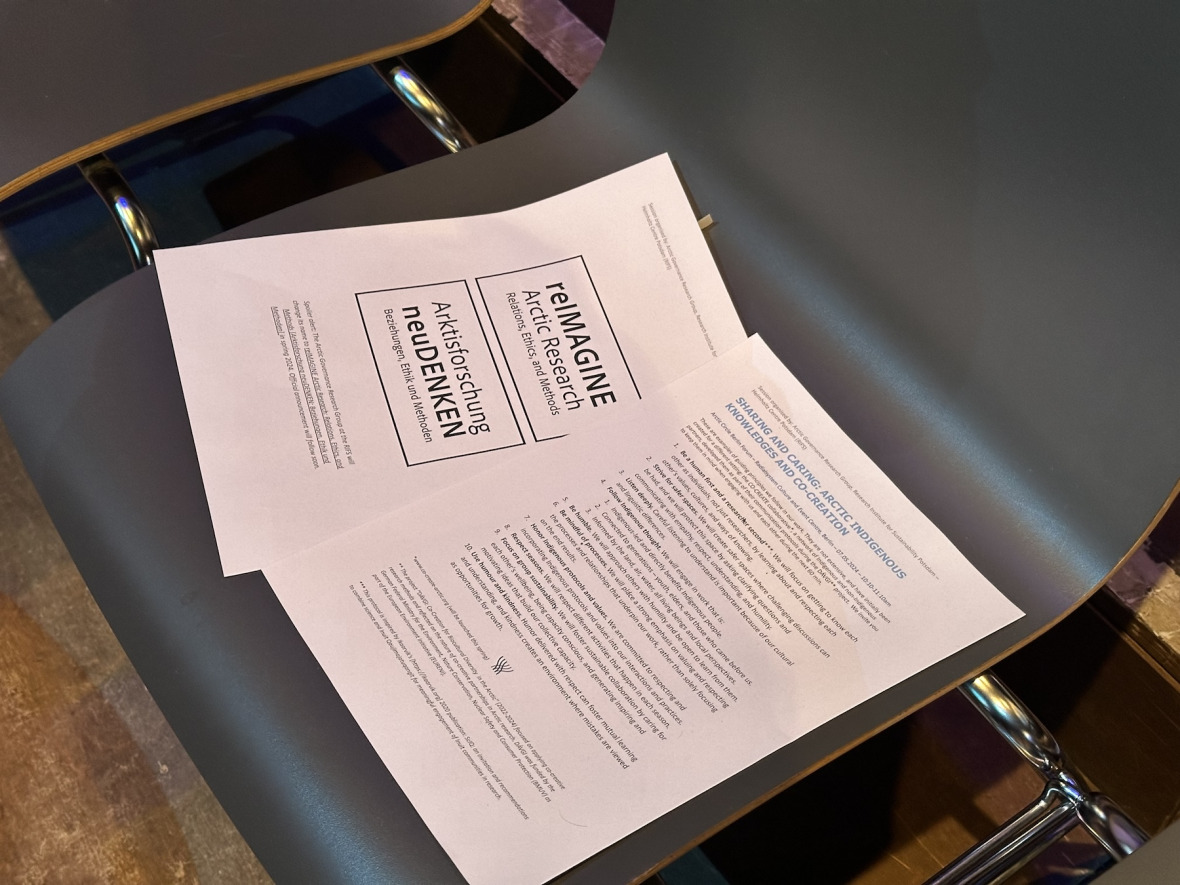Sharing and Caring: Arctic Indigenous Knowledges and Co-Creation
15.07.2024

Facilitating Spaces that Center Indigenous Perspectives and Participation in International Arctic Conferences
CO-CREATE Collaborative and Partners at the Arctic Circle Forum Berlin
On May 7, 2024, members and project partners of the CO-CREATE Collaborative presented a session titled “Sharing and Caring: Arctic Indigenous Knowledges and Co-Creation” at the Arctic Circle Forum Berlin (see Picture 1). Researchers Evie Morin, Nina Döring, and Anne S. Chahine are members of the RIFS Arctic Governance research group and part of the CO-CREATE Collaborative, a group of like-minded Indigenous and non-Indigenous partners interested in fostering co-creation in the Arctic, with a particular focus on practical ways to address ethical concerns in Arctic research. The Arctic Governance research group has an interest in “develop(ing) and research(ing) spaces of engagement, methodological frameworks, and evaluation processes that facilitate more ethical and equitable research relations across knowledge systems” in the circumpolar North.
The Arctic Circle organization describes itself as “the largest network of international dialogue and cooperation on the future of the Arctic and our Planet” (Arctic Circle, 2024). The 2024 forum held in Berlin was organized in association with the German Federal Ministry of Education and Research and the German Arctic Office of the Alfred Wegener Institute, Helmholtz Centre for Polar and Marine Research (AWI). The event, titled “The Arctic at Crossroads”, brought together governments, organizations, corporations, universities, think tanks, environmental associations, and other interested parties to discuss the role of science, climate, policies, and Europe in the Arctic.
CO-CREATE Collaborative contributors and project partners consider it important that Arctic Indigenous voices are (more) prominently centered and respected in international conferences and forums, reflecting their profound connections to the land, sea, and icescapes of the Circumpolar North. In contrast to lingering perceptions of the Arctic as an empty, white space (see e.g., McGhee, 2005; Mustonen, 2014; Hanrahan, 2017; Viljoen and Zolkos, 2021) devoid of inhabitants , this area of our globe is and has been home to a variety of Indigenous communities with a wealth of knowledge and expertise. As the Arctic faces accelerated climatic changes, co-equal collaborations respecting Indigenous rights as well as Indigenous-led research are crucial for addressing scientific, policy, and decision-making challenges, and our session “Sharing and Caring: Arctic Indigenous Knowledges and Co-Creation” was designed with that premise in mind.
The Session: Sharing and Caring: Arctic Indigenous Knowledges and Co-Creation
Moderated by Sámi Elder and professor of social work Jan-Erik Henriksen (UiT, Indigenous Voices research group), and introduced by RIFS research associate Anne S. Chahine, this session brought together Indigenous and non-Indigenous speakers from Sápmi, Kalaallit Nunaat, Nunavut, and Germany to touch upon perspectives from across the Circumpolar North and Europe.
The session opened with autoethnographic experiences from Kalaallit researchers Naja Dyrendom Graugaard (Aarhus University) and Vivi Vold (Ilisimatusarfik, University of Greenland), reflecting on what it means to work within dominant academic institutions marked by extractive research practices (see Picture 2). Their presentation was followed by a case study on bridging dominant academic and Indigenous knowledges so as to provide concrete recommendations to researchers and funders in the German research landscape, presented by Aslak Holmberg (Sámiráđđi/Saami Council) and Evie Morin (RIFS). The third talk focused on reflections on embodied learning as decolonial practice, presented by Jan-Erik Henriksen and Nina Hermansen (UiT, Indigenous Voices research group), and Anne S. Chahine and Nina Döring (RIFS), a team of Indigenous and non-Indigenous scholars from Sápmi and Germany. Finally, a video message from Michael Milton and Shelly Elverum of Ikaarvik, an organization based in Nunavut and working for Indigenous youth involvement and leadership in Arctic research, introduced the audience to the concept of ScIQ and the “Mitten Model”. ScIQ is an invitation and recommendation to combine Inuit Qaujimajatuqangit and Western science, whereas the Mitten Model uses the process of sewing mittens as a metaphor for how Inuit guidance improves ethical and equitable research processes and the quality of research outcomes. All four presentations were linked by the aim of creating greater awareness in Arctic research and decision-making about different ways of knowing and being in the world.

Centering Indigenous Voices in Arctic Dialogues and Decision-Making Spaces
Many large, international conferences focused on Arctic research and decision making are imagined as spaces that invite equals to meet and collaborate. They emphasize the universal impacts of climate change and the need to unite in order to identify solutions. In practice, however, it is difficult to achieve equity in these spaces, as they largely reflect dominant Western perspectives and often overlook the fact that not all groups contribute to or are equally affected by Arctic concerns (Larson, 2022). This is particularly true for Indigenous Peoples, who have lived in the Arctic for millennia and maintain deep L/land relations.
It is therefore essential that these forums center the voices of Arctic Indigenous Peoples, recognizing them as inhabitants, scientists, stewards, and decision makers of the region since time immemorial. For this to happen, we – including conference organizers, German institutions, and decision makers – need to resolve numerous practical barriers that hinder Indigenous participation in discussions about their homelands. Examples of such obstacles include invitations to speak about pre-defined topics rather than on matters of their own choosing, or facing high registration fees to participate in the first place. To counter these dynamics, the RIFS Arctic Governance research group, together with our partners, aimed to co-organize and co-design the session for the Arctic Circle Forum Berlin in a way that addressed some of these issues, in order to promote greater equity in these spaces.
Developing a Session in a Capacity-Conscious and Co-Creative Manner
The Arctic Governance research group and partners aimed to develop their presentation in a capacity-conscious and co-creative manner. To achieve this, RIFS researchers assumed administrative roles, such as communicating with the Arctic Circle organizing team, securing funding for and booking travel arrangements for some of the attendees, and establishing online spaces to collaborate on the session concept. The RIFS Arctic Governance research group also provided initial ideas and drafts to get the group started, but simultaneously clarified that the message was not predetermined and that the final content would be developed together. The co-presenters met virtually multiple times prior to the conference, with the overall narrative of the presentation taking shape under the guidance of Indigenous partners and the messages they wished to convey.
In addition to co-developing the content for the session, these meetings were also used to reflect on the set-up of the presentation space. As previously mentioned, Indigenous Peoples are often underrepresented – as both speakers and attendees – at international conferences and other gatherings. Consequently, the relationship between the presenters and audience, especially during the question-and-answer session, became a key point of discussion. Ultimately, our group agreed that all presenters would feel most comfortable if we structured the space as a Talking Circle, which moderator and Elder Jan-Erik Henriksen would then facilitate; and that we would reserve a brief period at the end for a Q&A session with the audience. We communicated our vision of engaging with each other by providing a set of guiding principles – originally developed by the CO-CREATE Collaborative – that were shared on the screen behind us and on printouts placed on the audience’s seats (see Picture 3). With the help of these principles, we aimed to connect with the audience and invite everyone to interact respectfully during our shared time together.

Considering Indigenous Individuals’ Circumstances when Organizing an Event
In dominant academia and decision making, Arctic Indigenous Peoples are often provided few resources to support their involvement in international gatherings, despite their crucial role in these discussions. Many Indigenous organizations and experts face chronic underfunding and lack long-term financial support, leaving their time and effort for involvement and travel uncompensated (Fache, 2014; Austin et al., 2018; Reed et al., 2021). In addition, travel also proves to be challenging for many Indigenous participants who live in the Arctic, as the long distances involved make travel both time-consuming and costly. With limited financial and personnel capacity but growing demands (Holmberg, 2021), Indigenous participants may also need additional advance notice to prepare for and attend events (Herrmann et al., 2023).
The German Arctic Office demonstrated awareness of such barriers, and made efforts to minimize them ahead of the Arctic Circle Forum Berlin. They connected with the Arctic Governance group before the registration period, to encourage attendance by Indigenous speakers. Thanks to the efforts of the German Arctic Office and the Arctic Circle organizing team, registration fees were waived for the Indigenous co-presenters of our session, thereby facilitating their attendance. In future, free attendance for Arctic Indigenous Peoples (speakers, contributors, and attendees) should be standard practice at all international Arctic-focused gatherings. Additionally, along with ample time and resources to prepare sessions, we believe that the role offered to Arctic Indigenous Peoples in these gatherings deserves re-thinking. For instance, Indigenous experts should have the option to become part of the decision-making and planning process from the outset as paid consultants and full partners, providing crucial knowledge and expertise on the most appropriate and relevant set-up and focus of conferences and gatherings as well as the selection of contributions (sessions and presentations). In the overall funding landscape, Indigenous-led conferences and gatherings should be prioritized.
Despite not initially planned as a hybrid event, we are grateful to the Arctic Circle organizers for agreeing to include virtual contributions in our session. This enabled Shelly Elverum and Michael Milton of Ikaarvik, both based in Nunavut, and Nina Hermansen from the Indigenous Voices Group Indigenous Voices group at UiT, based in Alta, Sápmi, to prepare video messages for our session, which became part of the running order and were then played back on-site in Berlin (see picture 4). As a result, extensive and costly travel by those two parties could be avoided without losing their contributions to the conference, in turn preserving their perspectives that shaped the overall session.
Conclusion
The RIFS Arctic Governance research group was pleased to support the gathering of crucial voices at the Arctic Circle Forum Berlin and to participate in sharing different Arctic research perspectives situated in a variety of epistemologies. Sharing our experiences of attending various events, including the Arctic Circle Berlin Forum, we hope this blog post will be helpful for those interested in hosting a session or event that aims to bring greater equity to international, Arctic-focused gatherings. However, our reflections presented here are just surface level: For future partnerships, the task of tackling broader systemic issues is unavoidable, and it continues to be deeply problematic that Arctic Indigenous People are often invited into predefined discussions about their ancestral territories as guests with only limited ability to steer the agenda. Indigenous voices remain a minority at international events focused on shaping the Arctic, including events hosted in Germany such as the Arctic Circle Forum Berlin. Germany is among the many countries and interested parties that do not call the Arctic home but yet continue to claim an investment in it. We wish to emphasize that this is also a learning process for us as well, and that we are grateful for critical feedback and advice.
A recording of the session is available on the RIFS YouTube Channel.
Credits and Acknowledgements
This session received financial support (for travel, work hours, food, and accommodation) from: UiT The Arctic University of Norway; the Research Institute for Sustainability – Helmholtz Centre Potsdam (RIFS); and the German Federal Ministry for the Environment, Nature Conservation, Nuclear Safety, and Consumer Protection (BMUV) as part of the European Environment Initiative (EURENI).
We are grateful to the program coordinators and organizers of the Arctic Circle Forum Berlin, especially Leonie Mädje, for supporting the realization of this session and accommodating the varying requests of our speaker team; to Anna Mihelsone and Cordula Granderath from the RIFS administration for their logistical support; and the team at UiT for arranging travel. We are especially grateful to our co-presenters for the time spent during preparation and at the Arctic Circle Forum in Berlin, and for the lessons we learned during this process.
References
Arctic Circle. (2024). About Us. Arctic Circle. https://www.arcticcircle.org/about.
Austin, B. J., Robinson, C. J., Fitzsimons, J. A., Sandford, M., Ens, E. J., Macdonald, J. M., ... & Garnett, S. T. (2018). Integrated measures of Indigenous land and sea management effectiveness: Challenges and opportunities for improved conservation partnerships in Australia. Conservation and Society, 16(3), 372–384.
Fache, E. (2014). Caring for country, a form of bureaucratic participation. Conservation, development, and neoliberalism in Indigenous Australia. Anthropological Forum, 24(3), 267–286.
Hanrahan, M. (2017). Enduring polar explorers’ Arctic imaginaries and the promotion of neoliberalism and colonialism in modern Greenland. Polar Geography, 40(2), 102–120. https://doi.org/10.1080/1088937X.2017.1303754.
Herrmann, T. M., Brunner Alfani, F., Chahine, A., Doering, N., Dudeck, S., Eisler, J., Fjellheim, E., Henriksen, J. E., Hermansen, N., Holmberg, A., Kramvig, B., Keskitalo, A. M. N., Omma, E. M., Saxinger, G., Scheepstra, A., & van der Schol, J. (2023). Comprehensive policy brief to the EU Commission: Roadmap to decolonial Arctic research. University of Oulu, Helmholtz-Centre for Environmental Research (UFZ), The Indigenous Voices (IVO) research group - Algoalbmogii jienat, Arctic University of Norway UiT, Saami Council. Alta - Karasjohka - Leipzig - Oulu. https://doi.org/10.25365/phaidra.400.
Holmberg, A. (2021). Working towards ethical guidelines for research involving the Sámi - A discussion paper on the work done so far and considerations on a process to develop common Sámi guidelines. Saami Council. https://www.saamicouncil.net/documentarchive/working-towards-ethical-guidelines-for-research-involving-the-smi.
Larson, A. M., Barletti, J. P. S., & Vigil, N. H. (2022). A place at the table is not enough: Accountability for Indigenous Peoples and local communities in multi-stakeholder platforms. World Development, 155. https://doi.org/10.1016/j.worlddev.2022.105907.
Liboiron, M. (2021). Pollution is colonialism. Duke University Press.
McGhee, R. (2005). The last imaginary place: A human history of the Arctic world. Oxford University Press.
Mustonen, T. (2014). Window in the skies: Indigenous memory, resistance and experience of Eurasia and the onslaught of resource extraction in the Arctic. Nordia Geographical Publications, 43(1), 67–73.
Reed, G., Brunet, N. D., Longboat, S., & Natcher, D. C. (2021). Indigenous guardians as an emerging approach to indigenous environmental governance. Conservation Biology, 35(1), 179–189.
Viljoen, J.-M., & Zolkos, M. (2021). Reimagining cultural memory of the Arctic in the graphic narratives of Oqaluttuaq. Memory Studies, 15(2), 257–270. https://doi.org/10.1177/17506980211037283.


